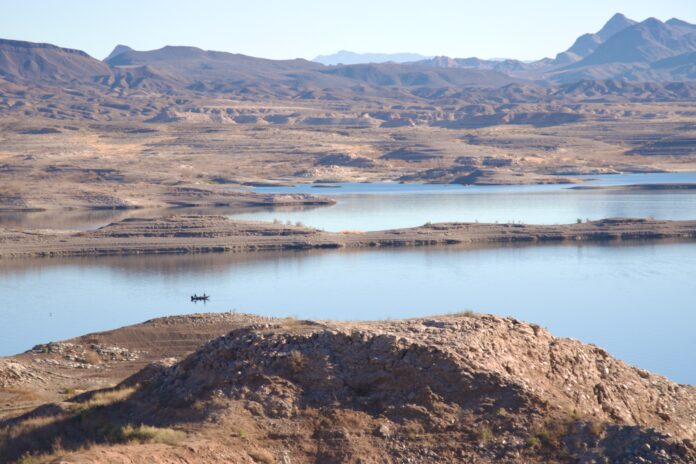
Lake Mead’s water levels continue to drop amidst a declared water shortage and the Southern Nevada Water Authority (SNWA) works to continually limit water demand.
In August of 2021, the U.S. Department of Reclamation declared a water shortage of the Colorado River Basin amidst a “megadrought” that has been affecting the Las Vegas Valley since 2000, according to multiple sources.
“‘Drought’ is a word that has an indication that it’s going to end someday,” said SNWA Director of Water Resources, Zane Marshall. “And the recent climate science and hydrologic science in the basin suggests that this is really more like a permanent ratification of the basin.”
The water shortage is currently classified as a “first tier” shortage, with higher restrictions when water levels drop further, according to multiple sources.
Nevada has to cut its water usage from 300,000 acre-feet to 279,000 acre-feet. An “acre-foot,” equates to an entire acre of land covered by one foot deep of water. Currently, one acre-foot is enough to serve approximately two Las Vegas homes for one year, according to Marshall.
“With the conditions on the Colorado River and with the declaration of shortage that happened last year,” Marshall said. “We’re having to get more aggressive about our conservation initiatives.”
Of the water delivered to the Las Vegas Valley, about 60% of it is used for outdoor purposes and is lost. The remaining 40% is used indoors and can be recycled back into Lake Mead, according to Marshall.
The SNWA’s conservation efforts focus largely on outdoor water usage.
This effort for conservation can be seen in the SNWA’s seasonal watering restrictions. These restrictions set guidelines for Southern Nevada residents to only water their grass three days a week in the fall and spring, one day a week in winter and prohibit watering during peak daylight hours in summer. Failure to follow these restrictions may result in fines.
The SNWA also fines citizens for general water waste. If they find a resident is wasting water, the SNWA enforces a fine to violators. The price for these fines are based on the amount of waste and prior history of the person wasting.
SNWA also pays residents to remove their grass in the Water Smart Landscapes Rebate Program. Southern Nevada residents can apply to receive $3 per-square-foot of grass removed and replaced with desert landscaping in their yards up to 10,000 square-feet. After 10,000 square-feet, it pays $1.50 per-square-foot.
A recent law signed in June 2021 banned installing ornamental grass in new developments in Nevada, and mandating existing ornamental grass removal by 2027, according to multiple sources. Ornamental grass isn’t recreational, so it does not apply to schools, parks and cemeteries. Residences that already have existing grass are not required to remove grass, but do have to comply with current restrictions.
The SNWA is also looking to impose restrictions on evaporative cooling systems, such as cooling towers and swamp coolers, according to Marshall. According to the SNWA, evaporative cooling is the second largest consumptive use of water in the Las Vegas Valley.
Marshall talked about how costs for replacing evaporative cooling and ornamental grass have created some challenges to the SNWA’s efforts. He mentioned that some establishments don’t want to pay to replace their cooling systems and some Home Owners Associations like their ornamental grass.
“I would say that those are not impossible barriers,” Marshall said. “Because our future depends on us becoming more efficient as a community.”
Both Marshall and Bronson Mack, SNWA Public Information Officer, pointed out that any resident of Southern Nevada can help with water conservation.
Changing yards to desert landscaping, regularly inspecting irrigation systems and talking to other residents about water conservation all help save water. Mack also mentioned that residents can also report water waste to the SNWA.
“Everybody contributing and doing their part to conserve is exactly what we need,” Mack said. “But it’s not just ‘Hey, I conserved some water yesterday,’ right? It’s conserving water day after day, after day. Being mindful, and especially on the stuff that we use outdoors, because that’s the water we only get to use once.”
